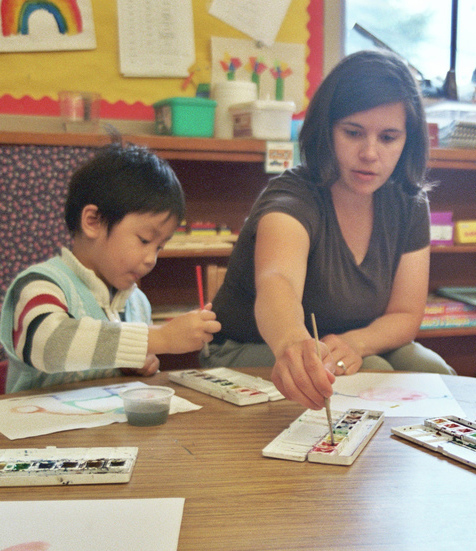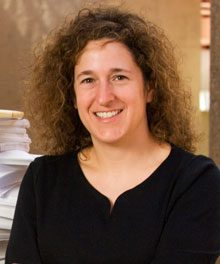

Daycare workers and preschool teachers are more educated, receive better pay, and remain longer in the field today than in 1990, but they continue to be poorly compensated, to have high turnover, and to lack Bachelor's degrees, according to a new study by researchers from the Stanford Graduate School of Education, the University of Virginia and Cornell University.
The findings — the results of the first-ever comprehensive study of the early childhood care and education (ECCE) workforce — are particularly relevant given President Barack Obama’s plan to provide universal preschool, though the study was completed before he announced his proposal.
The researchers began the study as federal and state policy efforts were underway to enhance the quality of daycare and preschools. By analyzing data from over the last two decades, they hope to better understand how the workforce is changing and what is driving those changes.
The paper was accepted for publication last year by the journal Education Finance and Policy, and it will appear online and in print in a forthcoming edition.
“Our research helps to fill a critical knowledge gap,” said study co-author, Susanna Loeb, the Barnett Family Professor of Education at the Stanford Graduate School of Education. “We know remarkably little about the people providing care for our children." Loeb is also the director of Stanford GSE’s Center for Education Policy Analysis.
In the United States, most young children receive regular care from someone other than their parents. The quality of this care is of great importance, because early childhood is a critical period for development. In fact, previous research has established that high-quality childcare can improve children's outcomes as distant as high school graduation rates and adult earnings.
Recognizing the importance of ECCE, federal and state governments have taken a number of initiatives to improve access to quality childcare. For instance, under the latest reauthorization of the federal Head Start program, 50 percent of Head Start teachers must hold a Bachelor's degree in child development by the fall of this year. Also, 25 states are operating or developing Quality Rating and Improvement Systems for childcare programs. “Unfortunately, we have little understanding of how these policies, and their predecessors, have affected the early childhood workforce. Specifically, are ECCE workers more qualified today than they used to be?,” said Loeb.
Using Current Population Survey (CPS) data, Loeb and her colleagues found that, in general, daycare workers and preschool teachers fare poorly by a number of proxies for quality. Almost 40 percent of workers in the ECCE field have no more than a high school degree, and on average they earn only $11.70 per hour. They also leave the field at very high rates. About one quarter of ECCE workers in 2009 were no longer a part of ECCE in 2010.
On delving deeper, the researchers found that these statistics mask considerable differences within the field. In particular, workers' characteristics vary depending upon whether they work in a center-based setting (56 percent of ECCE workers in 2010), a home-based setting (26 percent), or a school (18 percent), with school-based workers exhibiting the strongest credentials and home-based workers possessing the weakest resumes. For example, in 2010, 61 percent of school workers had at least a Bachelor's degree, compared with 24 percent of center-based workers and 15 percent of home-based workers.
Additionally, the researchers discovered that, over the past 20 years, ECCE workers have improved their status in some important respects. In 2010, 28 percent of ECCE workers had at least a Bachelor's degree, compared with 21 percent in 1990. Their average hourly wage increased by approximately 33 percent (after being adjusted for inflation) over the same time period. Also, they now leave the field at lower rates: 24 percent per year in 2010 versus 33 percent in 1990.
The researchers had hypothesized that a shift in the composition of the ECCE field was primarily responsible for the overall improvements in the ECCE workforce. Over the past 20 years, in response to policy initiatives such as state-run pre-kindergarten, center-based and school-based ECCE programs have expanded rapidly, and the workers in these more "formal" sectors of ECCE tend to have better credentials than their home-based peers. In fact, the researchers do document a significant movement towards center-based care and away from home-based care. Between 1990 and 2010, the percent of ECCE workers in center-based settings increased by 18 points.
But the researchers determined that this shift does not account for the improvements in ECCE workers' credentials. Rather, it appears that workers within both the center-based and home-based ECCE sectors improved over time. Even more surprisingly, home-based workers, who are subject to the least amount of regulation, improved the most, and their gains played the largest part in improving the field as a whole. For instance, between 1992 and 2010, the percent of home-based workers with at least a Bachelor's degree increased from six percent to fifteen percent.
“Our findings are both concerning and encouraging,” said Loeb. “While childcare workers remain poorly qualified, progress over the past two decades is a cause for measured optimism. Hopefully, future research will help us understand why home-based workers, in particular, have been making gains and how to extend these improvements both within that setting and to the ECCE field at large.”
The other co-authors are Daphna Bassok of the University of Virginia, Maria Fitzpatrick, of Cornell University, and Agustina Paglayan of the Stanford GSE. The research was supported by a grant from the Institute of Education Sciences.
Rachel O'Brien is a research associate and writer at the Center for Education Policy Analysis.
Subscribe to our monthly newsletter.